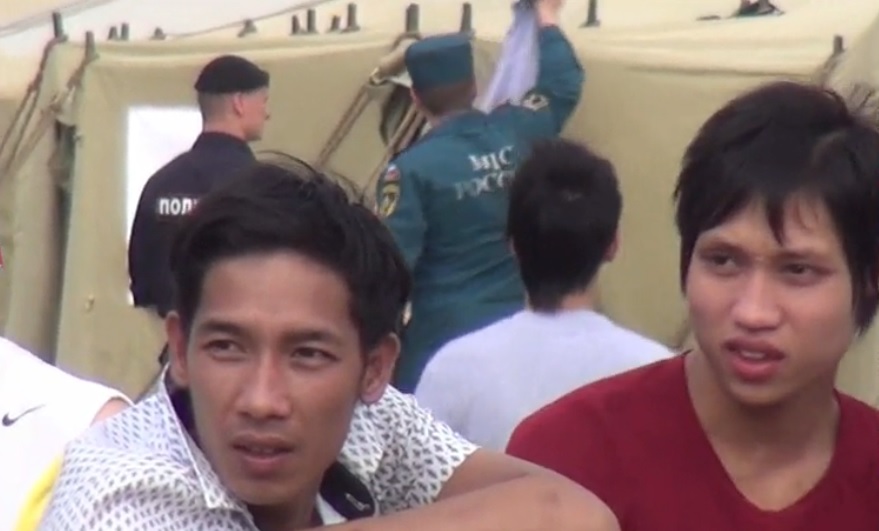
Holding Camp for Illegal Immigrants Hastily Opens in Moscow
Publication: Eurasia Daily Monitor Volume: 10 Issue: 157
By:

On August 1, Russian police raided the “Sadoved” market in the Kapotny region of Moscow and arrested close to 1,000 people, primarily Vietnamese traders who were in the country illegally. The traders were detained in a camp in the Golovino region of eastern Moscow, which had been hastily constructed for this purpose. Human rights defenders have called the camps illegal under international law (https://www.gazeta.ru/social/2013/08/07/5544669.shtml). The move came just a few days after the Moscow police were involved in closing down the Matvevyskoe market after friends of one of the Dagestani traders working there attacked an arresting officer. Those raids had also provoked police operations to “cleanse” markets of illegal migrants from Dagestan, which is part of the Russian Federation (see EDM, August 5).
As noteworthy as the initial arrests were, it is the conditions in the Golovino camp that were most alarming. Video footage from the campsite looks surreal as it shows canvas tents next to high-rise residential accommodations (https://tvrain.ru/articles/sergej_mitrohin_tualety_u_migrantov_v_goljanovo_chistye_my_proverjali-349782/). Sanitary facilities are provided by a number of portable toilets. The implication is that the arrests were not a planned police activity, which had been well thought through, but rather were made, if not at the spur of the moment, then at least in definite haste. The camp was built on August 1 to cope with overflow from existing detention centers. And, according to the chief consulate officer at the Vietnamese embassy in Moscow, the camp suffered from “inhuman” conditions. Up to 40 people held at the camp were crammed into a space of only 50 square meters (https://grani.ru/Politics/World/Asia/m.217577.html), leading some to compare the facility to a concentration camp. Furthermore, Human Rights Watch claimed that the people in the camp were arrested for having a “non-Slavic appearance” and that the institution of the camp violated international norms (https://news.rambler.ru/20524584/).
Such reports about the appalling conditions of the camp were refuted by Moscow mayoral candidate Sergei Mitrokhin (of the United Democratic Party “Yabloko”) who visited the camp on August 11. Mitrokhin reported difficulties in communicating with any of the migrants held there due the fact that they did not speak Russian, but described the conditions in the camp as suitable for life and said “the toilets at Golovino are clean, we promise” (https://tvrain.ru/articles/sergej_mitrohin_tualety_u_migrantov_v_goljanovo_chistye_my_proverjali-349782/).
Every country has the right to police illegal migration in the manner consistent with its own laws; the practice of locking illegals migrants in secure housing is practiced in the United Kingdom, France and the Netherlands, among others. Moreover, having so many land borders with less developed countries in Central Asia and the Caucasus, Russia is also relatively more exposed to illegal immigration than other countries. The apparent makeshift nature of the eastern Moscow camp raises some eyebrows, however.
It is also noteworthy that a candidate for mayor of the capital chose to visit the camp and act as an apologist for the policy, especially considering this candidate has virtually no chance of winning (https://jamestownfoundation.blogspot.com/2013/08/possible-consequences-of-matveyevskoye.html). Mitrokhin is from the liberal party Yabloko and his effective endorsement of the camp implies that tackling illegal immigration has become an integral part of the mayoral campaign. One can plausibly attribute that to Alexei Navalny, who has made tackling the issue of illegal immigration one of his key campaign pledges (see the PDF of his program, available from https://navalny.ru/bio/). Yet the very construction of the camp and rounding up of illegal immigrants is another sign that the incumbent, Mayor Sergei Sobyanin is competing with Navalny for the nationalist vote. This is despite the fact that migration and the illegal presence of foreign nationals on Russian soil is a federal matter, not one for local politics.
That said, the controversial camp appears to have been closed almost as fast as it opened. On August 20, the camp was reported shut down, 11 days ahead of its planned closing date at the end of August. Of its inhabitants, part had been deported and around 400 had been moved to another more satisfactory camp in the north of the city (https://www.gazeta.ru/social/news/2013/08/20/n_3124941.shtml). The Golovino camp was clearly only a temporary fixture, as by August 9, there were only 586 inmates left, 560 of them Vietnamese (https://lenta.ru/news/2013/08/09/vientamid/). For others, the Vietnamese embassy had found passports that had somehow been in their possession (https://ria.ru/moscow/20130816/956819076.html). Russian parliamentary deputy Mikhail Degtyarev was also suspicious, asking from where the Vietnamese consulate had collected roughly 200 passports.
The closure of the camp has not stopped further police raids to catch illegal migrants and the people who profit from their labor, however. In Moscow region, a further 160 Vietnamese migrant workers were arrested on August 19 (https://www.gazeta.ru/social/news/2013/08/19/n_3122645.shtml). Also arrested was a 33-year-old Muscovite allegedly involved in human trafficking. On a building site in southern Moscow, a further 150 people, whose nationality was not given, were arrested and charged with not having appropriate documentation (https://www.gazeta.ru/social/news/2013/08/19/n_3121173.shtml). The spate of arrests of illegal migrants indicates that the issue of migration—and, accordingly, the nature of Russian identity—is likely to play a prominent role in the Moscow mayoral elections on September 8 regardless of whether they are free and fair.




